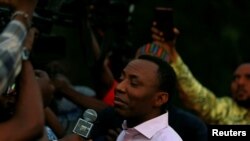West Africa has seen improvements in press freedom since the 1990s as democracy has taken root in the region. Since the coronavirus pandemic began, though, press freedom groups say security forces have assaulted journalists covering the outbreaks in Ghana, Nigeria, Senegal and Sierra Leone, among other countries.
The Media Foundation for West Africa’s Muheeb Saeed said reporters have also had their equipment seized or destroyed.
“The wanton attacks on journalists covering the pandemic have the potential to undermine the morale of the media personnel and hamper the media’s vital contribution towards efforts to contain the spread of the disease," Saeed said. "There is a sense of siege among media workers, which does not augur well for its role as a platform for educating, informing and sensitizing the population about the COVID-19.”
The foundation also monitors claims made in the media about the pandemic and has appealed to reporters to double-check facts before publishing, to stop the spread of disinformation.
The New York-based Committee to Protect Journalists’ Jonathan Rozen has also been monitoring attacks on the press in West Africa during the pandemic. He said governments are using accusations of false news on the coronavirus as a pretext to crack down on press freedoms.
“Now with authorities looking to curb misinformation in relation to the coronavirus, there are additional concerns that legislation or emergencies acts that include provisions that criminalize misinformation may be used against the press,” he said via a messaging app.
The committee cites instances of reporters being arrested or detained while covering the coronavirus pandemic in Ghana, Niger, Nigeria and Sierra Leone.
There are bright spots in West Africa, though. Gambia was a hot spot for press violations under longtime dictator Yahya Jammeh.
Gambian journalist Sheriff Bojang Jr. fled arrest to exile in Senegal, where he lived for almost a decade until Jammeh was forced to step down in 2017 under international pressure.
He returned to Gambia and became president of the Gambia Press Union, which has been working with officials to protect press freedoms, including in connection with COVID-19 reporting.
Speaking from Gambia via a messaging application, Bojang said the union was quick to speak out when an official threatened journalists who were investigating a quarantine center.
“We felt that the director’s threats were misplaced and of course this was an attack on press freedom," he said. "And we engaged the government and then, that never happened, journalists continued to do their work without any harm.”
Under Jammeh’s rule, press freedom groups documented cases of journalists being tortured, illegally detained, forcibly disappeared and even slain.






